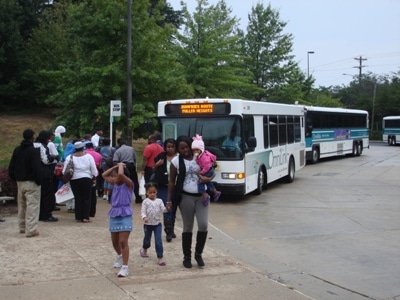When the House Ways and Means Committee voted to divert all gas tax revenue away from transit projects, severing transit's only dedicated source of federal funds, they were essentially throwing transit riders under the bus.

While the House's official stance is that their proposal still somehow guarantees funding for transit, it really does anything but. "It's not dedicated, it's not stable, it's not predictable... and it's not clear where exactly that money is coming from," said Francisca Porchas, lead coordinator for the advocacy organization Transit Riders for Public Transportation. "For regular bus riders, it's going to mean completely pulling the rug out from under them."
It's not like mass transit has been flying high lately, either. Over the past three years, there's been an onslaught of fare hikes, service cuts, and layoffs at American transit agencies, even as ridership hit record highs. Some 97,000 employees in the transit and ground transportation industry lost their jobs in 2009 alone.
Forcing transit to fight for funds from the general budget will also force transit agencies to make cuts immediately. Transit agencies like Virginia's Potomac and Rappahannock Transportation Commission would likely need to cut service and raise fares just as a contingency, since federal funds make up some 15-20 percent of PRTC's total budget, and state and local governments lack the wherewithal to step in if that money disappeared.
Furthermore, with their future funding in doubt, agencies will be forced to borrow money at higher interest rates, adding another level of costs to plans to add new capacity. That promises to bleed over into the basic services that agencies provide, making the trend of service cuts and fare hikes even worse.
"Where many transit agencies are trying to advance capital expansion, they are doing so instead of maintaining current service," Porchas explained. "Transit agencies will be making some tough choices, and they'll prioritize capacity expansion over operating and maintaining their system" if federal funding is suddenly threatened, she said.





